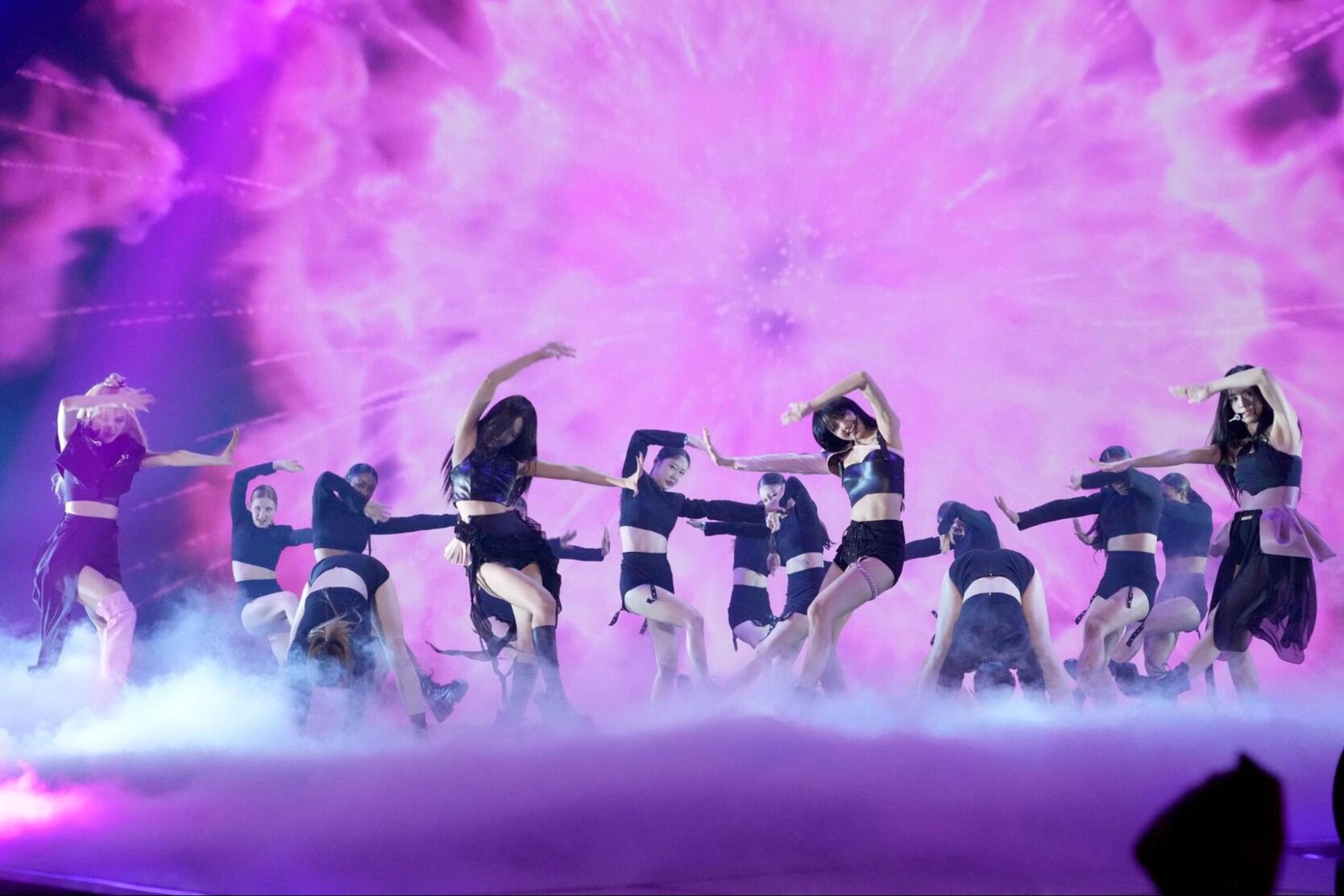Let’s say you’re a dude getting shot down cold by a girl sometime in the next decade or so. Chances are her snow-cone chilly catchphrase will come straight from Blackpink. Chances are you won’t know what just hit you, even though chances are she’ll add in a killer little hip-flip, with matching head-fake and hand gesture, based on countless hours practicing the choreography to “Pink Venom” or “Pretty Savage,” or “Shut Down” — none of which you’ve paid the least attention to whatsoever, because . . . well, you know: Because.
Because by far the most fascinating phenomenon in contemporary music — and not just music, but fashion, dance, style and attitude — just blasted across North America almost perfectly unnoticed. Unnoticed other than by screaming arenas full of howling, yowling, gleeful girls — a micro-thin slice of Blackpink’s 83 million Youtube subscribers (with 361 million American views last year before any new releases), packed into matching pairs of shows in Dallas, Houston, Atlanta, Chicago, Newark, Toronto and Los Angeles — two shows a city, forty thousand tickets per, before heading off to seven European countries, then Australia, Asia, and the Middle East. Oh, but there was a truly attentive review in the Harvard Crimson, deftly written by a junior cheerleader.
Other than that, though, as far as mainstream media was concerned, and despite being YouTube’s single most subscribed act in all of, uh, you know, history, despite two just released videos (racking up a total 700 million views in three months, with five million comments, no less) and despite any one of their songs having more hooks than a square yard of velcro, Blackpink might as well have been on a super secret spy mission.
They did, however, speak at the UN, at the Annual Sustainable Development Goals Moment. (See! Who says the UN has no sense of humor?) Blackpink sat solemn and still and said, in English, “All of us deserve a world abundant of nature, energy and livelihood. We, Blackpink, have embarked on our journey to learn and act now.”

Also Read
THE COOL WAR
Abundant! Act now! Hell yeah! “Blackpink was appointed as Advocates for the United Nations Conference on Climate Change in 2020,” blathered the UN press release, syntax be damned, “and has been delivering powerful messages to the world ever since.” Damn straight! Like, for instance, the powerful messages in “Shut Down,” their latest and definitely maybe probably their greatest single/video-thang yet:
Stay in your own lane ’cause I’m ’bout to swerve
Catch me when you hear my Lamborghini
Go vroom, vroom, vroom, vroom…
Pedal to the metal, we go two-zero-five
Shut it down, uh-uh, uh-uh

Let’s not start bagging and slagging on Blackpink for their brief outbreak of Self-Righteous PopStar Hypocrisy Syndrome, the dread disease that already has so many pre-eminent poster boys’n’gals, from Bruce to Bono to Bridgers, that the committee isn’t even considering new candidates until 2027. Instead, let’s simply consider them — consider the wondrous wonders of Blackpink. Because they’re as jaw-dropping a pop music phenom as any I’ve ever encountered, and you’re talking to a guy who not only saw ABBA — they were pretty damn great live, by the way — but bought the tour t-shirt.
Stay in your own lane, ‘cause I’m ‘bout to swerve. (How ya like that?) See, the thing about Blackpink is when they’re talking about that Lamborghini they’re ‘bout to swerve past you, vroom vroom, then shut your sad ass down… well, if they don’t actually own one, they could probably go buy a few if the mood strikes. Hell, one of ‘em, according to the video for “Shut Down” — I think it’s Jisoo — has her own huge tank, layered lavishly in disco-ball mirrored armament. (Unless those are UN-approved solar panels. Either way, they’re abundant. And shiny!)
Everything about Blackpink is abundant — everything screams glossy abundance. They make old school hip-hop’s obsession with bling and Benjamins and Cristal seem quaint, crude, pathetic, an under-funded investment in cheese-flavored crypto-currency as viewed from a penthouse suite in the Swiss banking sector of Seoul.
In an era when luxury brands are sought after as if they magically conferred celebrity — Do they? Don’t they? — luxury brands line up to seek out Blackpink. Deals with Dior, Cartier, Bulgari, YSL, Tiffany abound, turning the luxury brands into desperate suitors; Need a lesson, see the necklace, see these dresses? We don’t buy it, we request it. Thus, the lust for luxury branding is built into the songs themselves, pre-packing the videos with mad desire and the looming fear of scarcity, sneering with shut-down superiority, with regal hauteur, proudly demanding to be paid off in your puny peasant resentment.
The videos and the music — which is which? — rob and plunder pitilessly, pirating more cultural artifacts than any Louvre could ever hold, flashing drug-deal cash-wads whenever they’re not too filthy rich to deign to carry a Hermes bag. The soundscape veers and careens from Bollypop spices to lime-tart symphonic riffs to Arabic calls to prance, abruptly down-shifting to trap beats and the hip-hop street slang from decades past, revived to rock the streets of Seoul, and then the world. The songs — are they songs, really? No, they aren’t, and yes, they totally are — are far too hyped-up hyper-fast to hold still, squirming with hooks and shifty sudden reversals, unfolding and re-folding in ever-changing layers like only the greatest pop music ever does, like only the greatest pop music ever can: Whispering silently, arrogantly, secretly, boldly, sympathetically, then hollering loud and un-ladylike, grabbing and owning any listener who wanders by foolishly minding their own business. Blackpink’s songs both sneak up on you and clobber you with a sleek platinum sledge-hammer. You’ve never in life heard more hooks crammed into a song — plus visual hooks, dance hooks, style hooks — and less concern for keeping the Lamborghini between the lane stripes, swerving and grinding the guardrails, shutting you down, then spinning off squealing donuts just because rubber is meant to burn — sorry but not sorry, UN climate nerds. Look at me; now look at you — How ya like that?

Swerve left — dim the stage; costume change. Does it matter if any of the women in Blackpink wrote a single word in any of the songs they sing? Or composed even a wee note? It does, definitely… as long as you have some lingering allegiance to the Rock Era’s worship of the virtuous singer-songwriter, writing his band’s songs in a righteous rebuke to the Tin Pan traditions of showbiz. Then again, girl groups never measured up well against that standard, did they? And we’re not just talking Spice Girls, or TLC or Destiny’s Child, because some of the most meaningful music of the last century, the most moving, most enduring and most endearing, was made in the early 1960s by manufactured girl groups given dopey names like the Shirelles, the Ronettes, the Crystals, the Shangri-Las, singing songs written and produced by showbiz outsiders and leftovers, almost all men, almost all white, and almost always all not as sexy or sweet or soulful as the girls they set forth to sing their songs. Some things never change.
A Blackpink song is by definition a video, but massively, mightily so, a stunning, swaggering, staggeringly grand assemblage, glittery and gleaming and busier and noisier than what you’d get if you up-ended the entire Brill Building, the palace at Versailles, tossed in Radio City’s Rockettes and the complete wide-screen chromatic paintbox of Pixar’s CG palette-choices, then dumped ‘em all into ProTools. Just as Motown gathered together choreographers, an etiquette coach, songwriting and productions teams, radio-promotion hustlers and fixers and the badass Funk Brothers, all hidden away behind the velvet curtains of the Supremes and the Temptations, Blackpink is simply the most ambitiously focused contemporary version of that assembly-line approach ever, on an expansive, all-inclusive scale that would give Berry Gordy either a heart-attack or a hard-on. Motown’s loftiest goal wasn’t to be Detroit’s biggest label, the most successful manufacturer of soul music, or the biggest of black businesses. No, it was bound and determined, breaking free of broadcast segregation, to be this: “The Sound of Young America.” Meaning all of young America.
Founded by a former member of a Korean boy-band you haven’t heard of, YG Entertainment, the chaebol multi-corporation family operation that plays Motown to Blackpink’s Supremes, is, in no discernible order, a record label, a talent agency, a production company, a booking agent, a publishing company, with untraceable tentacles leading into sub-corporations that handle merchandising, make-up, and nightclubs, ever a handy tool for the sudsing and rinsing of money. It’s a model of the music business at its most efficient — that is to say, if you’re not a seeker of autographs and selfies — evil, and in most states in the US it would likely be illegal, if anybody ever pursued any music business prosecutions. (Cue: Canned sitcom laugh-track)
The ferocious ambition behind all this isn’t merely an extended exaggeration of the Motown model. That would be much too limiting, too short-sighted, too small town. This is a vision that, as seen and heard and displayed in the songs, chews up and gulps down the old fashioned world of Hollywood movie musicals, and the new-fashioned world of Bollywood, building training facilities and rehearsal halls like an Idol Got Talent show evolved from the glory days of Mao’s Cultural Revolution. It looks back to the old days of Tokyo’s Harajuku district, when vast corps of kids — takenoko-zoku, flash-mobs before that was even a thing, mostly girls, often directed by boys — assembled themselves on weekends into uniformed unison dance troupes; it looks to contemporary Harajuku, where leading edge youth fashion rules imperiously, flipping styles in unpredictable instant earthquakes. And all that ambition speaks to a world more defined by immigration than it ever has been, a world of borders that are expanding, contracting, exploding, a world where to have ambition, to dream of having ambition, is a risk.
Lalisa, the youngest Blackpink, from Thailand, was trained by YG Entertainment for four solid years of daily dance, vocal and Korean and English language classes before she rose to become a Blackpink. (The server at a Thai restaurant, who spoke modestly ok English, was so thrilled when I asked her about Blackpink that I could hardly keep up with the water she kept fetching; after we agreed that LaLisa was indeed from Thailand and not Korea, I nearly drowned. “I am so honored that you know this great star from my country,” she told me, and she meant it sincerely.)

There are so many good reasons to keep working hard at ignoring Blackpink. They’re K-Pop, and you don’t listen to that crap, do you? They’re one of those useless, hollow, pre-fab pop groups — Sorry, Pete Best, we’re going with Ringo; now, jump into those fab matching collarless suits, boys — and they’re too…well, you know…too girly! They sing sometimes in a foreign language — they’re foreigners! Not the familiar British kind, the English-speaking English-accented foreigners we’ve always embraced — they’re Asian. Plus, they’re so damn girly!
Blackpink is girly like your girlfriend is girly, if you’re lucky. Like your best friend, like your wife, like your daughter, if you have one. And if you have a daughter or two, chances are that not only do they adore Blackpink, they’ve probably done hours in front of a device-screen dancing, practicing the choreography of “Pretty Savage,” learning the onomatopoeia chants and triple-catchy catchphrases, googling up the Korean slang. All those haughty mean-girl things you’ve been hearing them say lately? Those unexpected, unexplained hip-juts and hand gestures? The worst of them aimed — obviously! — at you? The kind of things that make you feel old and out of it, lame before your time? “Look at you; now look at me — How ya like that?”
Bart Bull was, long, long ago, a staff writer and a West Coast Editor for SPIN. He wrote many legendary and sometimes award-winning stories for us, like this and this. This is his new column.




